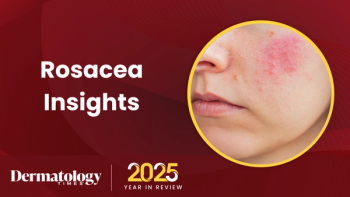
- Dermatology Times, March 2019 (Vol. 40, No. 3)
- Volume 40
- Issue 3
Nature-based skin care effective as adjunct to prescription rosacea therapy
Burt's Bees skin care products may be a effective as an adjunct to prescription therapy in the management of rosacea, according to data published in the February issue of Journal of Drugs in Dermatology which was reported at the American Academy of Dermatology Annual Meeting this month.
Eighty female patients with rosacea between the ages of 25 and 70 years old were first treated with topical 0.75% metronidazole gel twice daily. Following baseline assessments, the patients were randomized to receive – in conjunction with the topical therapy - either a four-week regimen consisting of a cleanser containing natural oils, beeswax and witch hazel and day and night creams containing natural oils, glycerin, and botanical anti-inflammatories or a four-week control regimen of cetyl alcohol, sodium lauryl sulphate-containing cleanser, and glycerin, polyisobutene-containing lotion.
Blinded investigator global assessment of rosacea, investigator-rated, and subject-rated overall skin appearance was assessed again at two and four weeks. The investigational regimen clinically and statistically improved erythema by 28%, telangiectasia by 26% and papules/pustules by 34% (p<0.001) while the control regimen improved rosacea symptoms by 8 to 12%.
Reference:
Draelos, ZD, Gunt, H, and Levy, SB. Natural skin care products as adjunctive to prescription therapy in moderate to severe rosacea. J Drugs Dermatol. 2019; 18(2):141-146
Articles in this issue
almost 7 years ago
Retired Mayo Clinic Dermatology Chair dies at age 82almost 7 years ago
Consumer survey ranks top non-surgical aesthetic proceduresalmost 7 years ago
RT002 performs well in late-phase studyalmost 7 years ago
Dermatology department renamed to recognize Dr. Phillip Frostalmost 7 years ago
Selling cosmeceuticals onlinealmost 7 years ago
Dermoscopy: The dermatologist’s stethoscopealmost 7 years ago
Sustaining a socioeconomically inclusive dermatology practicealmost 7 years ago
Novel dermatology drugs approved in 2018almost 7 years ago
Increasing skin water content and moisturizationalmost 7 years ago
Future of skin resurfacing lies in drug delivery, postprocedural careNewsletter
Like what you’re reading? Subscribe to Dermatology Times for weekly updates on therapies, innovations, and real-world practice tips.











